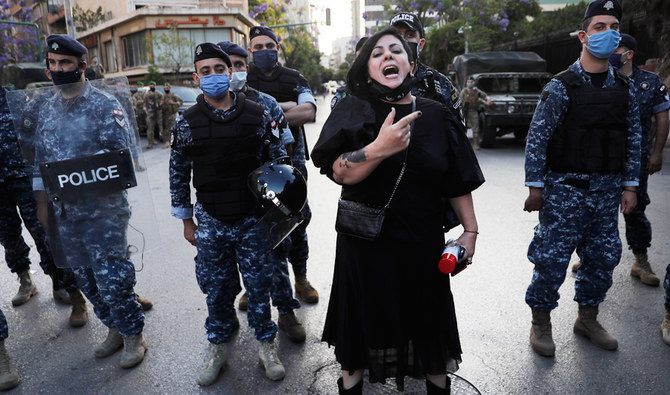
by arabnews.com — NAJIA HOUSSARI — BEIRUT: An increasing number of activists in Lebanon are being arrested amid mounting criticism on social media of the government’s handling of the country’s worsening economy. In the latest such incident, activist Michel Chamoun was arrested on Thursday by state security for writing comments on social media that were deemed humiliating to President Michel Aoun. Dozens of protesters blocked the main road linking Beirut to Jbeil and Tripoli, demanding the immediate release of Chamoun and chanting slogans and insults against Aoun and Free Patriotic Movement leader Gebran Bassil. This led to clashes with security forces before army commandos and military police intervened. An army officer and a number of protesters were injured.
On Thursday evening, Chamoun was released after Melhem Khalaf, head of the Beirut Bar Association, intervened. Chamoun said he was released due to pressure from the protesters, and prior to his release he had “to sign a pledge not to insult the president of the republic anymore.” But he insisted: “I will criticize anyone I want as we live in a democratic republic.” After his release, Chamoun headed with Khalaf to join the protesters on Jounieh highway. Then the protesters opened the road for traffic. Lawyer Hassan Bazzi, a member of the Lawyers’ Committee to Defend Protesters in Lebanon, told Arab News: “Freedom of expression in Lebanon is sacred, as stressed by the Bar Association. It’s protected by the Lebanese constitution.” But, he said, “what activists on social media don’t know is that there are limits to criticism, and the law forbids insulting the president of the republic.” Bazzi added: “People can no longer stand the pressure they live under due to the dire financial and economic situation, which has made them lose faith in the country.” It is “unacceptable for the political authority to try to intimidate activists, or to threaten them with arrest unless they delete their comments,” he said. “This is something to be done only upon a ruling by a judge upon the request of the public prosecutor. However, all security agencies try to intimidate opponents.”
The whereabouts of activist Kinda Khatib and her brother Bandar are still unknown after she was arrested by state security for publishing comments on social media. A campaign was launched on social media accusing her of being an Israeli agent. “In Lebanon, whoever insults the president is sentenced to two years’ imprisonment, while whoever insults God Almighty is sentenced to only one year in prison,” said Bazzi. “Parliament doesn’t intend to amend these laws for it runs against the interests of the political authority, which fears the mounting criticism of the people and protests on the streets.”
Activist Jad Shahrour of the Samir Kassir Foundation said during the last three years, repression in Lebanon has increased and public freedoms have diminished, especially after the demonstrations that erupted in October 2019. “There were more than 95 violations of the rights of media professionals and activists, including 18 cases that were referred to court trial,” he added. “This aims to make people aware that whoever expresses something that might annoy the political authority would be subject to arrest and interrogation.” The law on freedom of expression “is more than 30 years old, and doesn’t take into consideration that concepts and values have changed, and that methods of expression have evolved,” Shahrour said. “Yet the state is seizing the opportunity to proceed with its oppression.”



